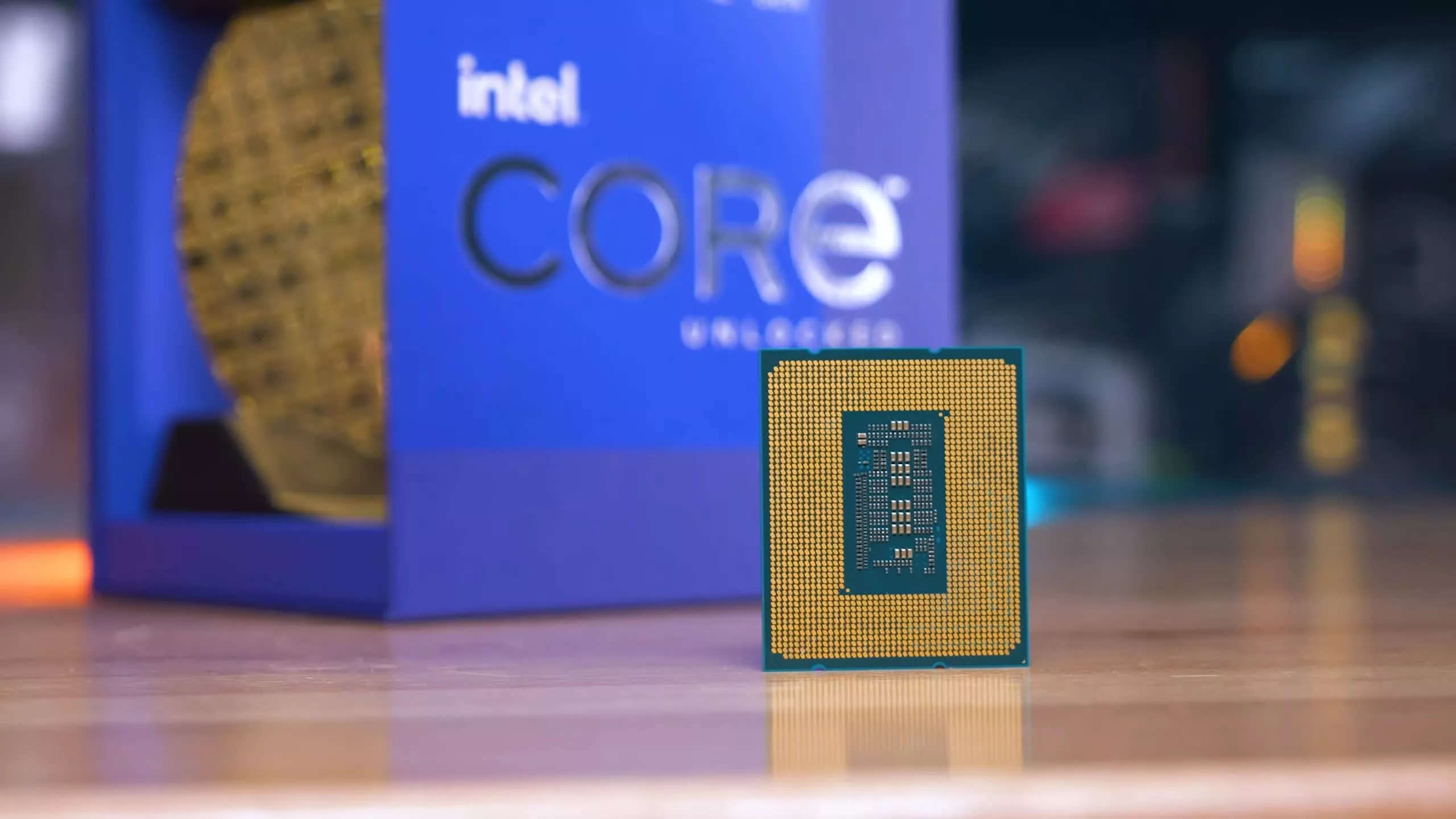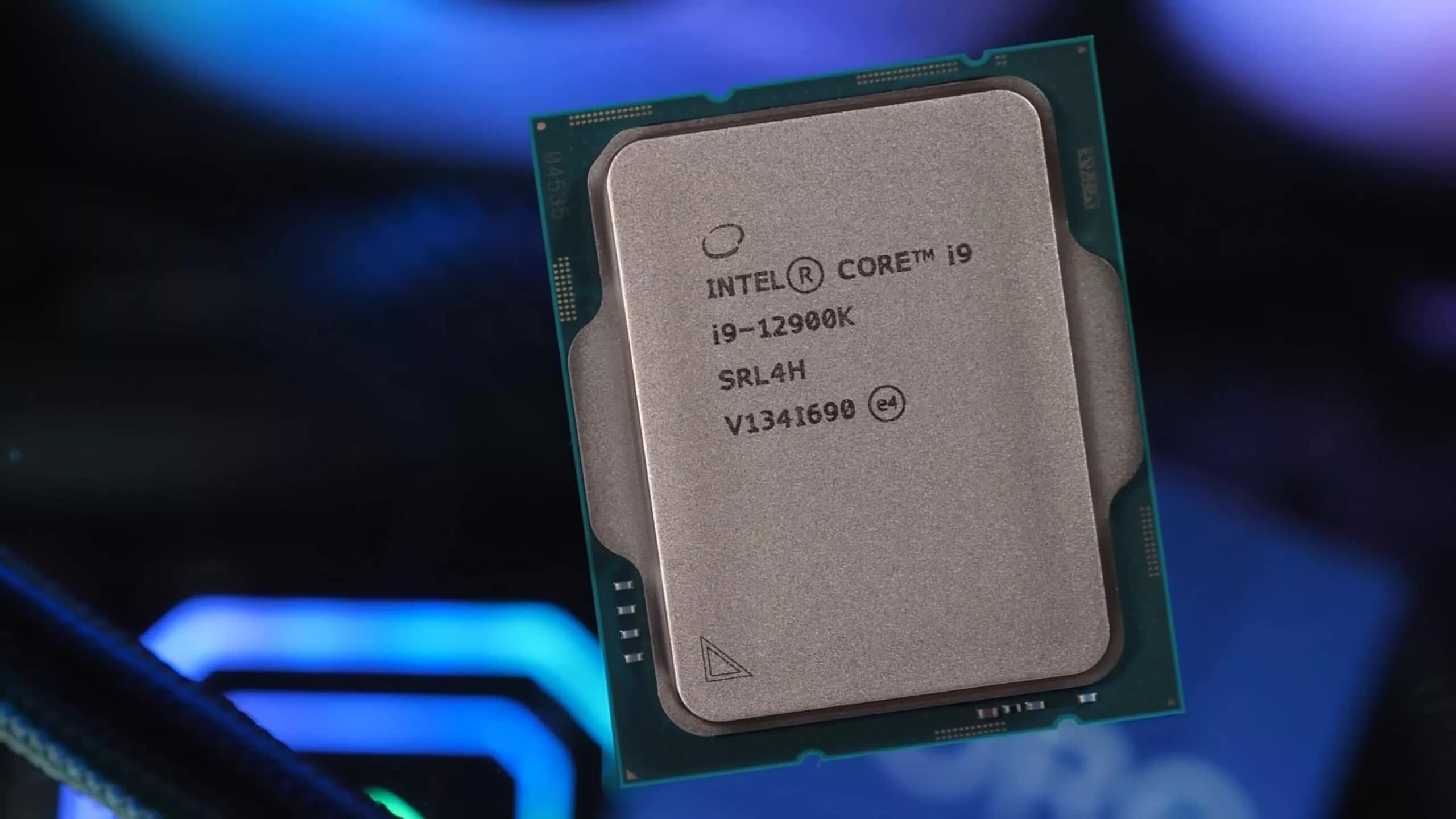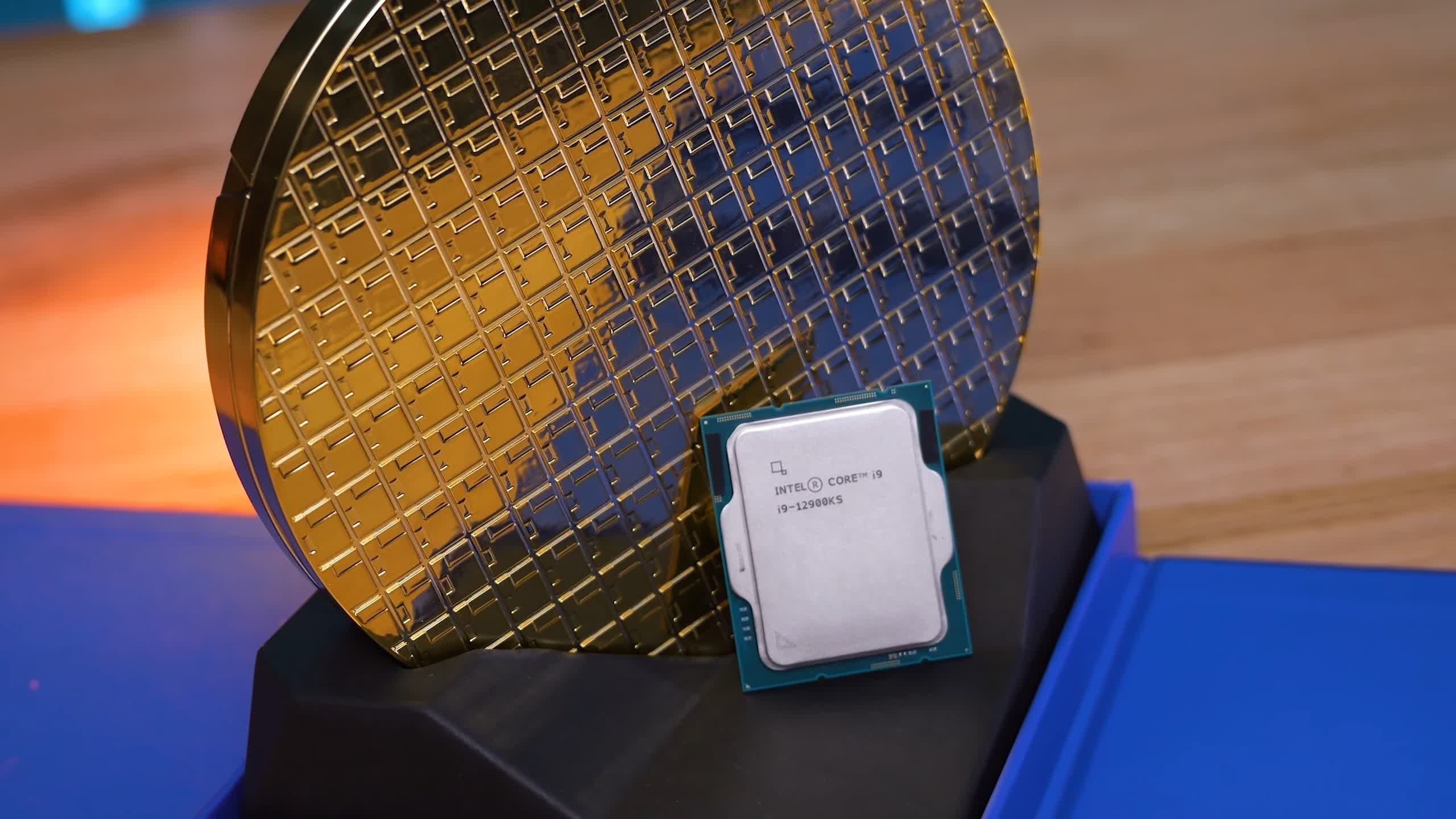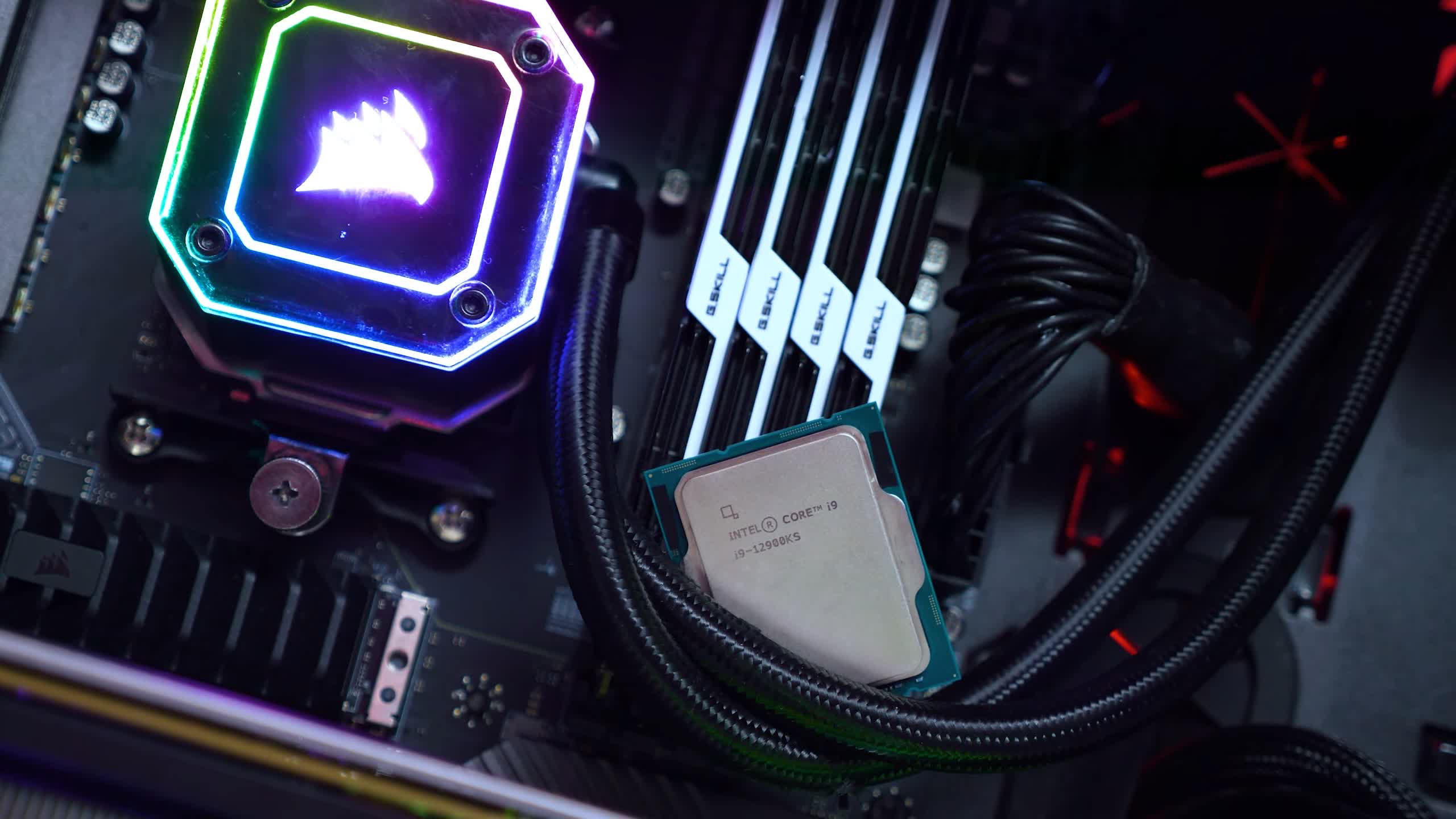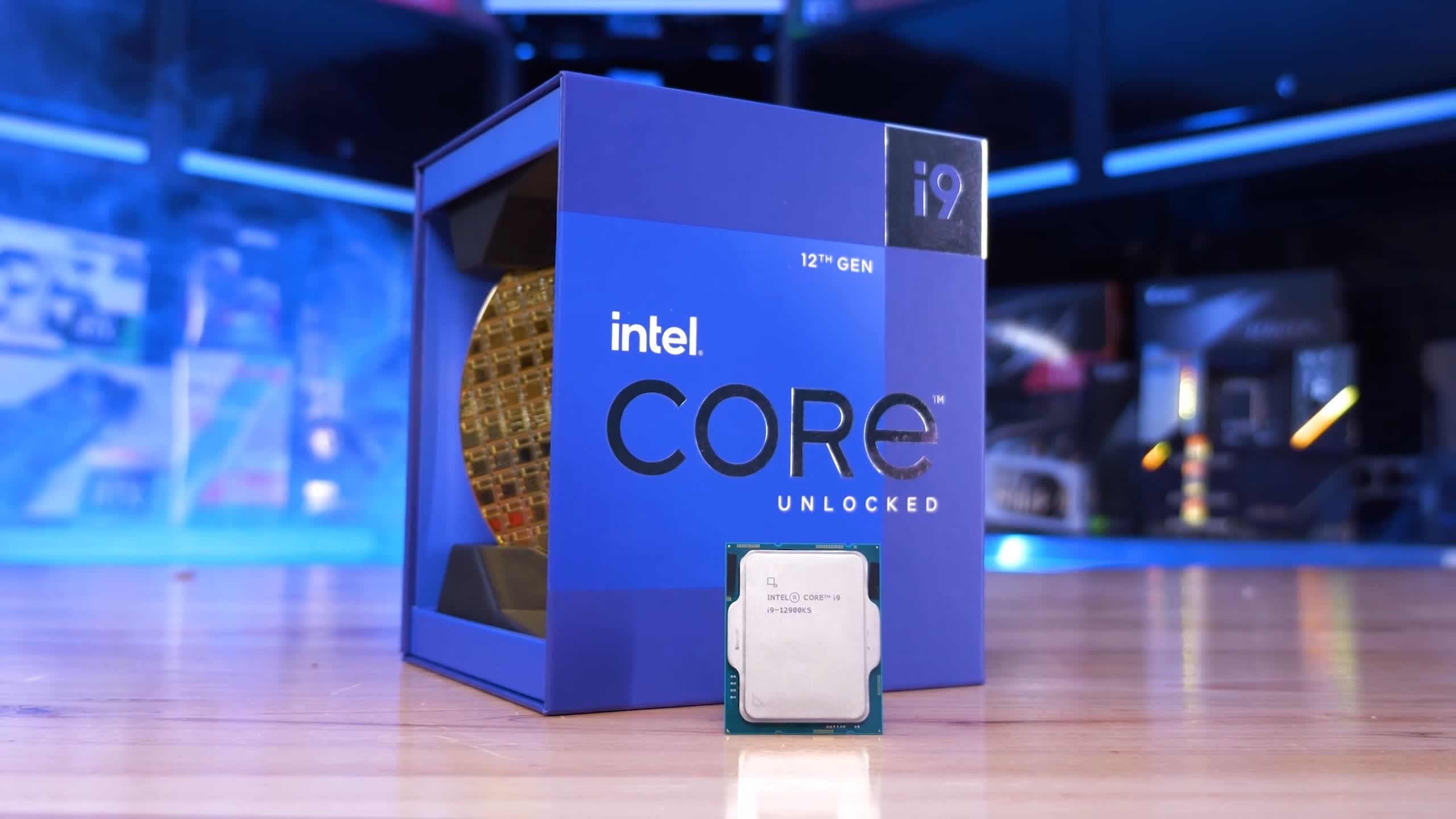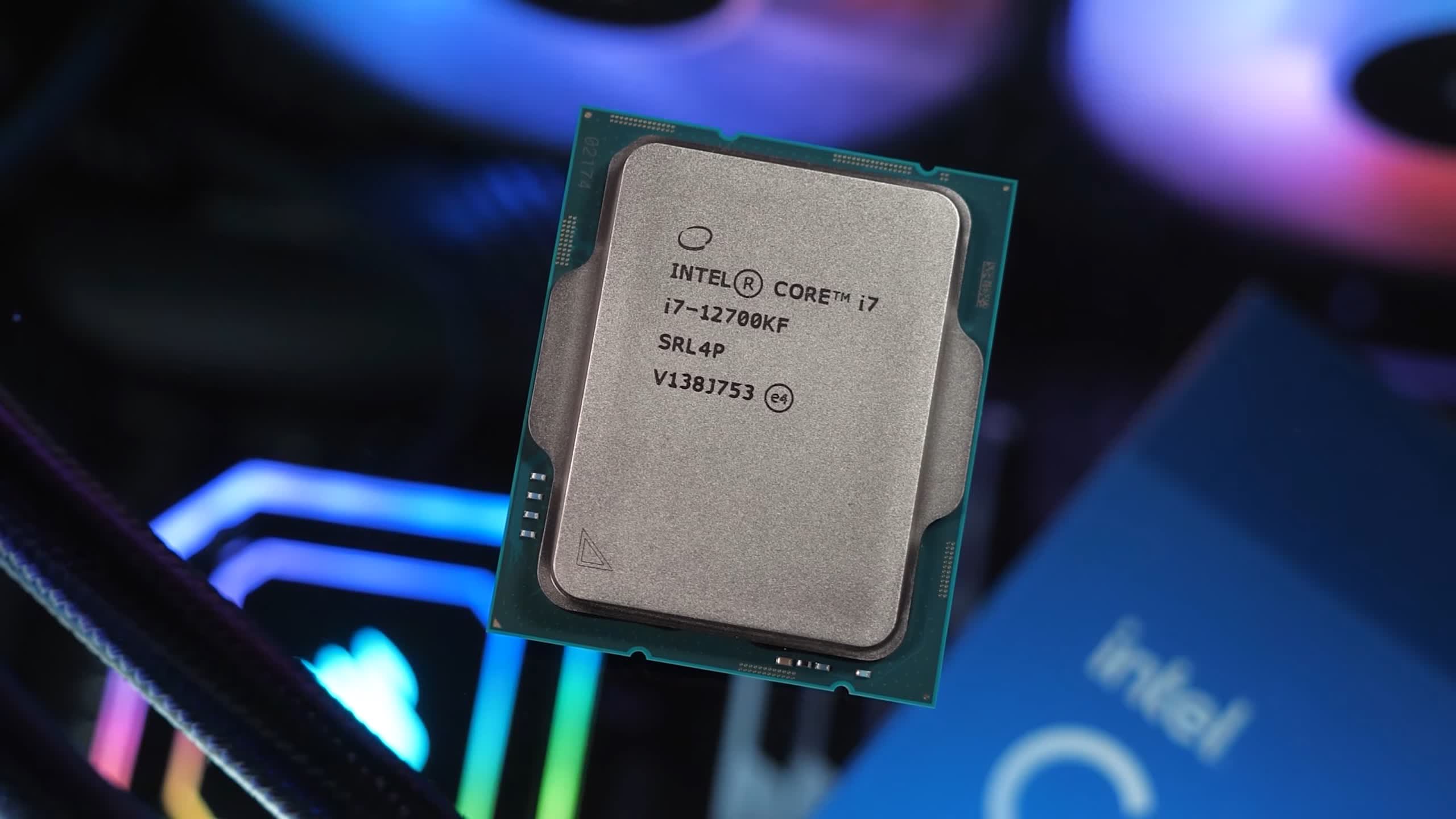The Core i9-12900KS is a new, but also not that new CPU from Intel. We reviewed the 12900K when it was released about six months ago and were very impressed with its performance. It was a great showcase for the Alder Lake architecture, though it was a hot and power hungry beast. That lead us to conclude the Core i7 models were the more practical choice for most gamers and enthusiast builders.
Then again, if you were after the best of the best, the Core i9-12900K delivered, beating the Ryzen 9 5950X in a number of productivity benchmarks while owning gaming. Fast forward to this day, AMD is set to strike back soon with the Ryzen 7 5800X3D and its fat 96 MB L3 cache. AMD is claiming a 10 to 15 percent performance boost in gaming, so they could topple the 12900K or at the very least trade blows.
Not wanting to give up the performance crown after finally winning it back, Intel has been saving the very best 12900K silicon they could produce, binning it for a KS model that clocks higher. They did this before with the Core i9-9900KS back in 2019 and we weren't that impressed with the result. Here's a short blurb from that review:
"... for most of you the Core i9-9900KS is a bit of a non-event. Personally, if I were in the market for such a processor, I'd save a few bucks and get the year-old 9900K. Worst case, if you get a dud, it'll be a few 100 MHz slower, but you'll have 2 years extra on the warranty."
Oddly, despite charging 15% more for the 9900KS for less than 10% more performance over the standard model, Intel slashed the standard warranty from 3 years to just 12 months. Thankfully, this time they haven't done that, so the 12900KS comes with the same 3-year warranty as the 12900K.
Do note that the jump in specs is underwhelming... the 12900K has a maximum turbo frequency of 5.2 GHz with a base of 3.2 GHz, the 12900KS clocks to 5.5 GHz for the turbo and 3.4 GHz for the base, which increases the TDP to 150W, up from 125W. As impressive as 5.5 GHz sounds, we're talking about a small 6% boost over the original CPU.
| Processor Model | Core Config | L3 Cache | P-Core Boost | E-Core Boost | Max Power |
|---|---|---|---|---|---|
| Core 9-12900KS | 16c (8P + 8E) 24t | 30 MB | 5.5 GHz | 4.0 GHz | 241 watts |
| Core i9-12900K | 5.2 GHz | 3.9 GHz | 241 watts | ||
| Core i9-12900 | 5.1 GHz | 3.8 GHz | 202 watts | ||
| Core i7-12700K | 12c (8P + 4E) 20t | 25 MB | 5.0 GHz | 3.8 GHz | 190 watts |
| Core i7-12700 | 4.9 GHz | 3.6 GHz | 180 watts | ||
| Core i5-12600K | 10c (6P + 4E) 16t | 20 MB | 4.9 GHz | 3.6 GHz | 150 watts |
| Core i5-12600 | 6c (6P + OE) 12t | 18 MB | 4.8 GHz | N/A | 117 watts |
| Core i5-12500 | 4.6 GHz | ||||
| Core i5-12400 | 4.4 GHz |
As for pricing, early listings in the US places the i9-12900KS at $800, fetching a 33% premium. In other markets such as Australia it's closer to 50%, with finalized pricing still pending at the time of publishing this review.
Because a 300 MHz turbo boost overclock isn't overly exciting and would make for a very boring benchmark session, we've gone back and re-tested the 12900K and 12900KS using the GeForce RTX 3090 Ti with DDR5-6400 memory for the gaming portion of the tests.
We've also included a configuration for the 12900K using dual-rank DDR4-3200 CL14 memory for comparison, though we didn't bother with the 12900KS because you'd only use that part with DDR5 memory considering the price. Also included is updated data for the Ryzen 9 5950X, 5900X and Ryzen 7 5800X, all using the RTX 3090 Ti and DDR4-3200 dual-rank CL14 memory. This will get us ready for when we review AMD's 5800X3D in a few weeks.
All benchmarks were run using Windows 11 with Resizable BAR enabled using the latest display drivers and motherboard BIOS versions. Let's now get into it.
Application Benchmarks
Starting with Cinebench R23, we find that the 12900KS is 6% faster than the 12900K. This is for an all-core workload and here the 12900KS clocked at 5 GHz, which is a very impressive all-core frequency.
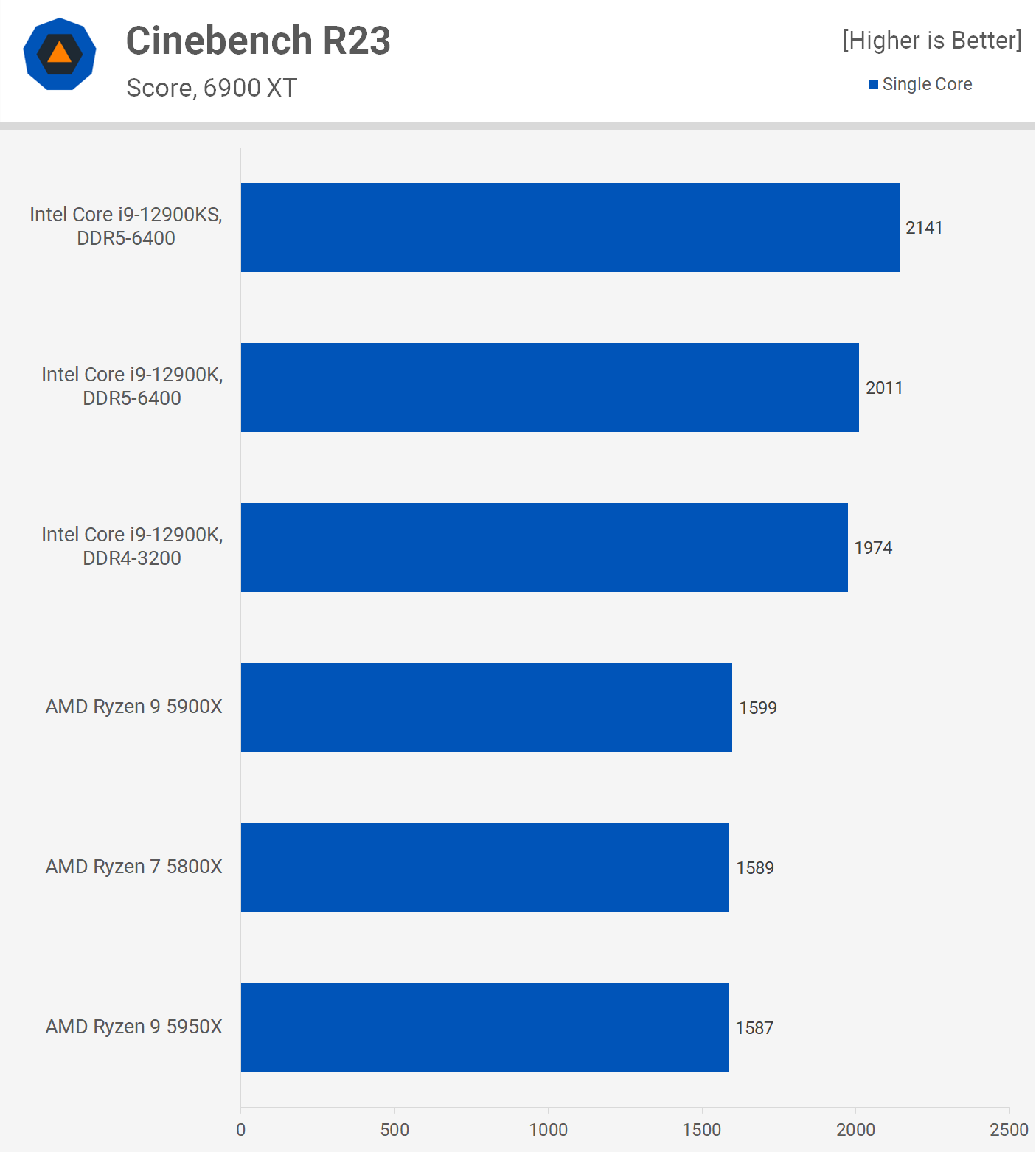
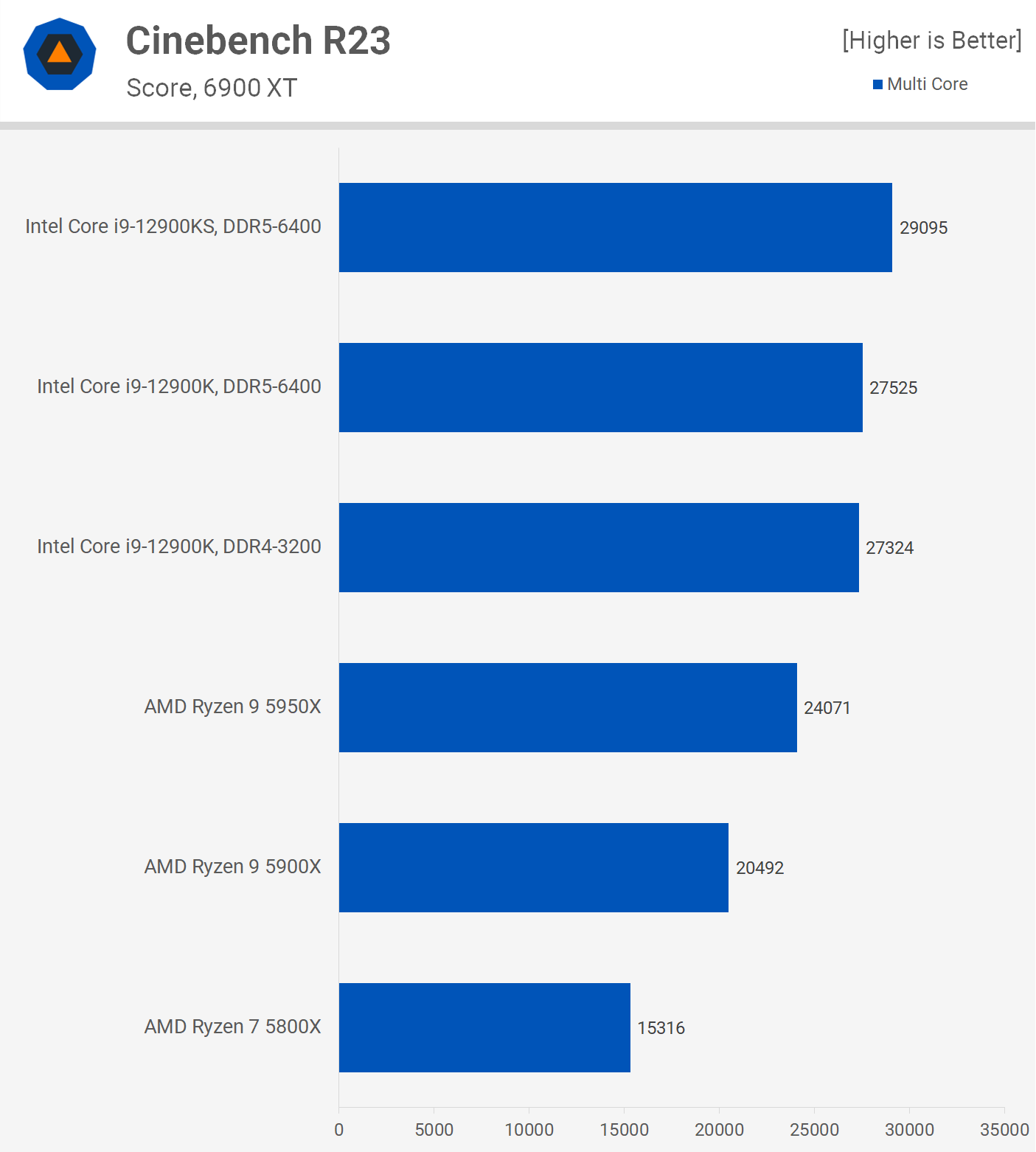
For single core performance we're looking at a 6% performance uplift again, as the 12900KS clocks up to 5.5 GHz, a 300 MHz boost over the 12900K.
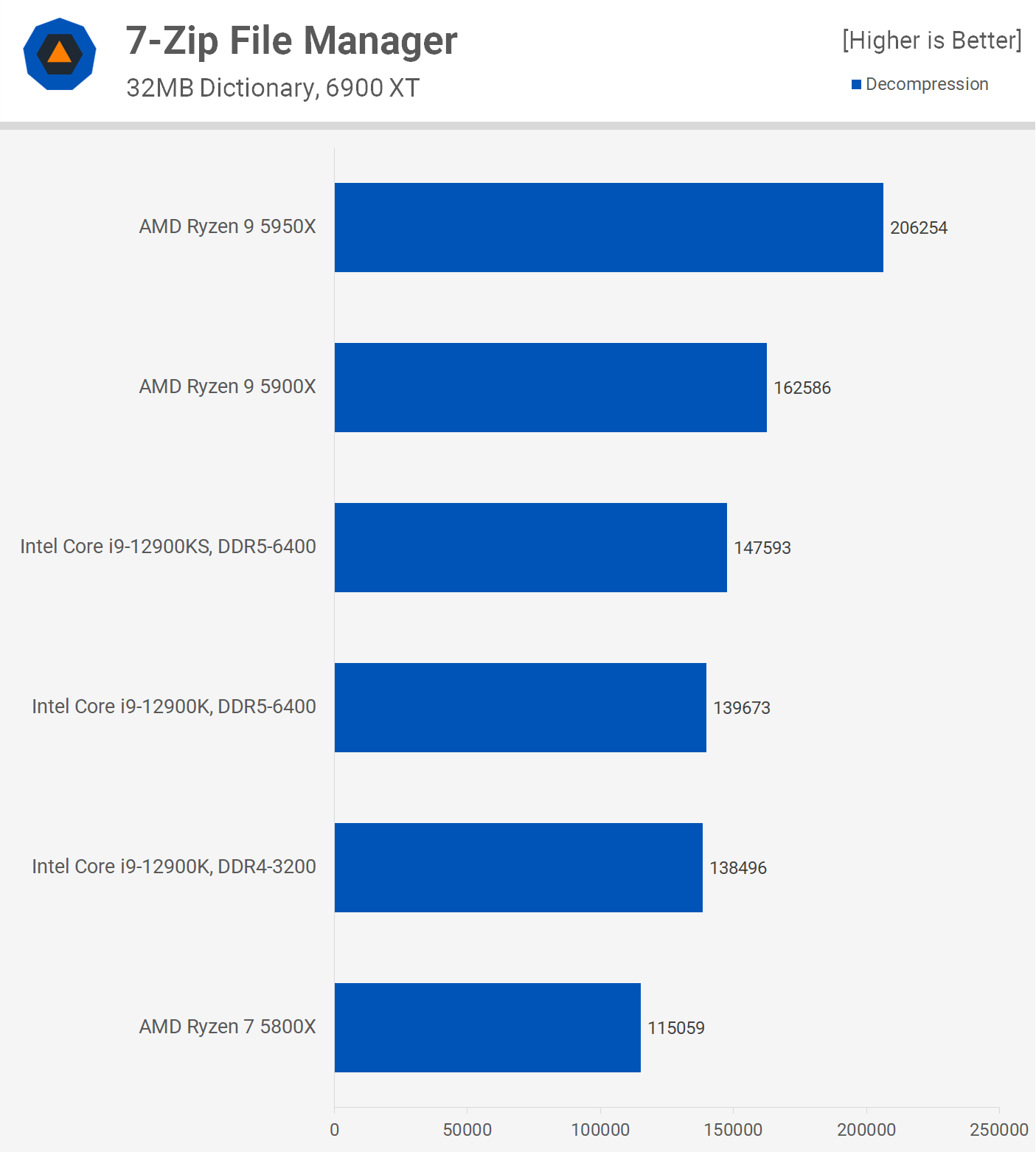
The 7-Zip File Manager benchmark also shows a 6% performance jump for the 12900KS over the original Alder Lake Core i9 for decompression work.

You're not going to believe this, but the 12900KS was exactly 6% faster than the 12900K in the Corona 1.3 Benchmark.

Bucking the trend is Adobe Photoshop 2022. Here we're only looking at a smaller 2% performance improvement for the overclocked KS model.
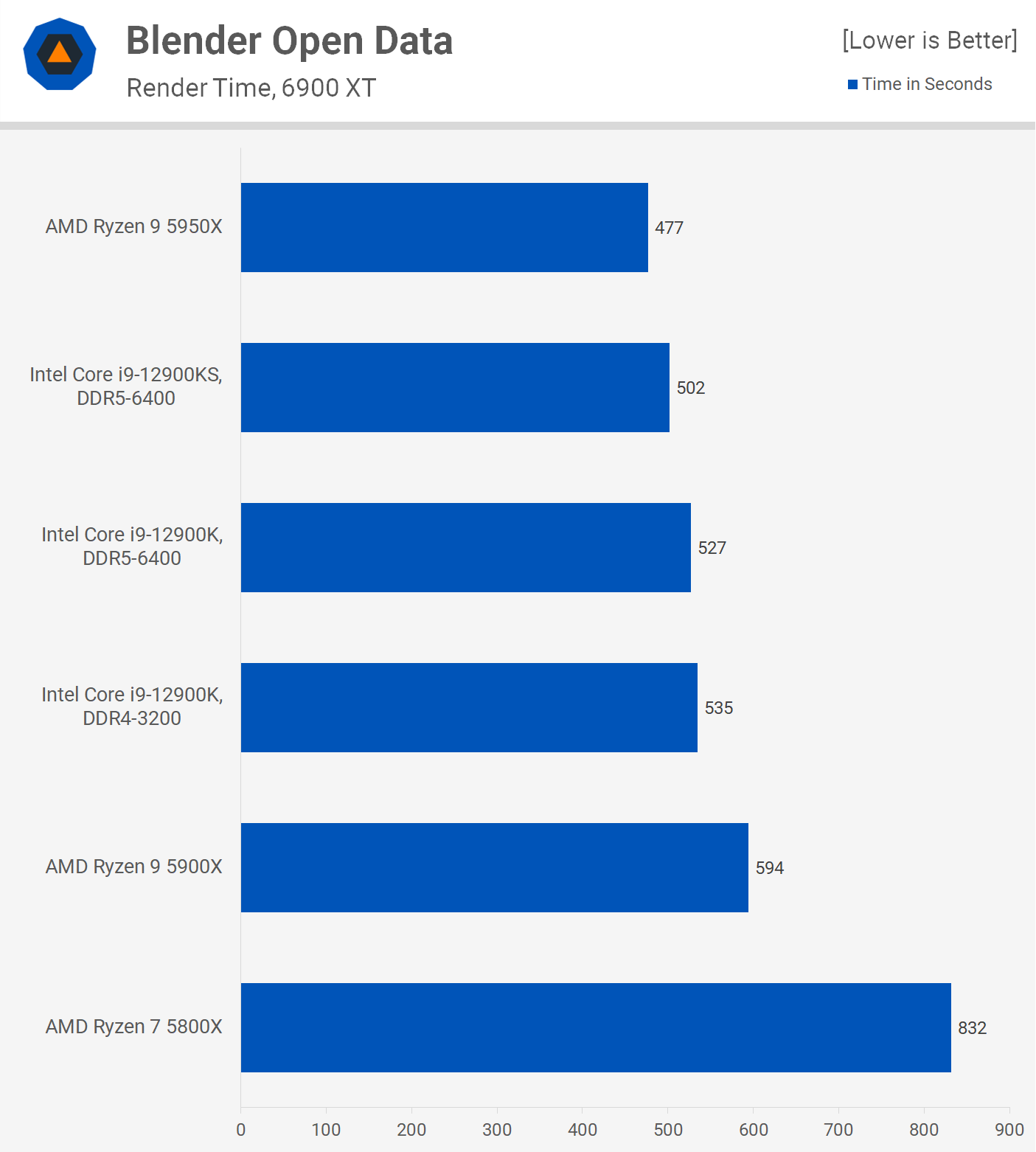
The last application benchmark that we're testing is Blender Open Data. The 12900KS was 5% faster than the 12900K, which is pretty much what we've come to expect.
Power Consumption

For that extra 5% performance, the total system power usage increased by almost 20%, hitting 426 watts which is pretty insane, especially given the 5950X peaked at just 221 watts. That means the 12900KS uses nearly twice as much power even though it's slower in this application. For those wondering how the 5950X uses less power than the 5800X and 5900X, it's due to binning, so the 16-core processor uses higher quality silicon.
Also read: What is Chip Binning? Hitting the Silicon Lottery Jackpot
Cooling
The 12900KS is a difficult CPU to keep cool. We used the MSI CoreLiquid S360 AIO liquid cooler which is very good, and still the 12900KS peaked at 102C installed inside a Corsair Obsidian 500D with a 21C ambient temperature.
This peak temperature was reached after 5 minutes of the Cinebench R23 loop test, though the same 5GHz all-core frequency was maintained for the next 55 minutes. Although it ran very hot, it didn't thermal throttle.
As for overclocking, we didn't try to push the 12900KS further as it's clearly thermally limited in our setup. We imagine very few will seriously overclock this CPU, it seems like something reserved for extreme overclocking using liquid nitrogen.
Gaming Benchmarks
Time for game benchmarking using the RTX 3090 Ti. Starting with Far Cry 6, which is a lightly threaded game that leans heavily on the primary thread, we see that the increased IPC of Alder Lake is of great benefit.
Using the same DDR4-3200 memory, the 12900K is 24% faster than the 5950X. Then with DDR5-6400 the 12900K enjoyed a mild 8% performance bump and the 12900KS was just 1% faster.
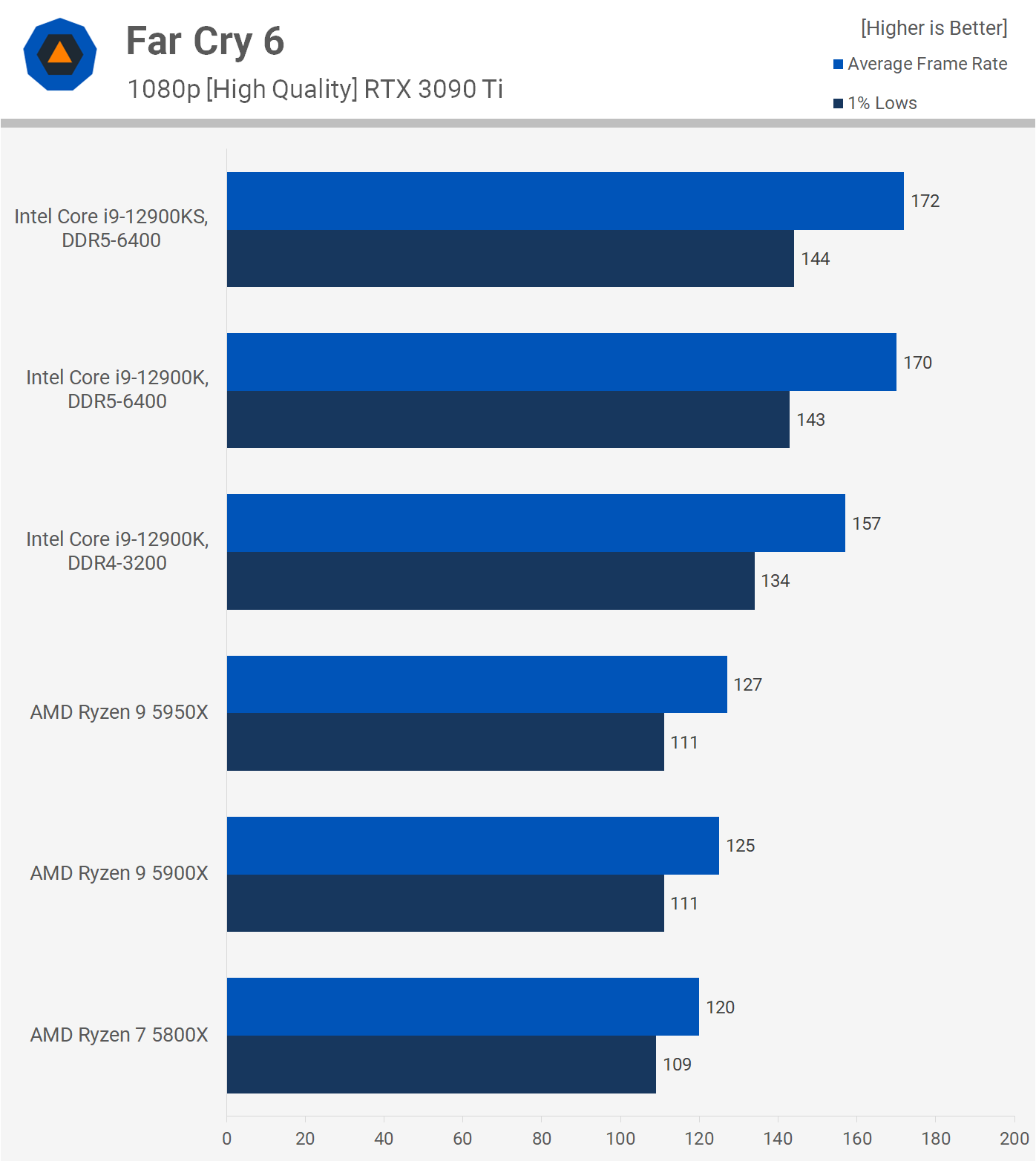
The increased clock frequency of the 12900KS doesn't amount to much here. But if you're looking for the ultimate setup for playing Far Cry 6 at the highest frame rates possible, the 12900K was 35% faster than the 5950X. You could squeeze a little more out of the 5950X with low latency DDR4-3800 memory, but it won't be much better than the Samsung B-die modules we've used for testing.
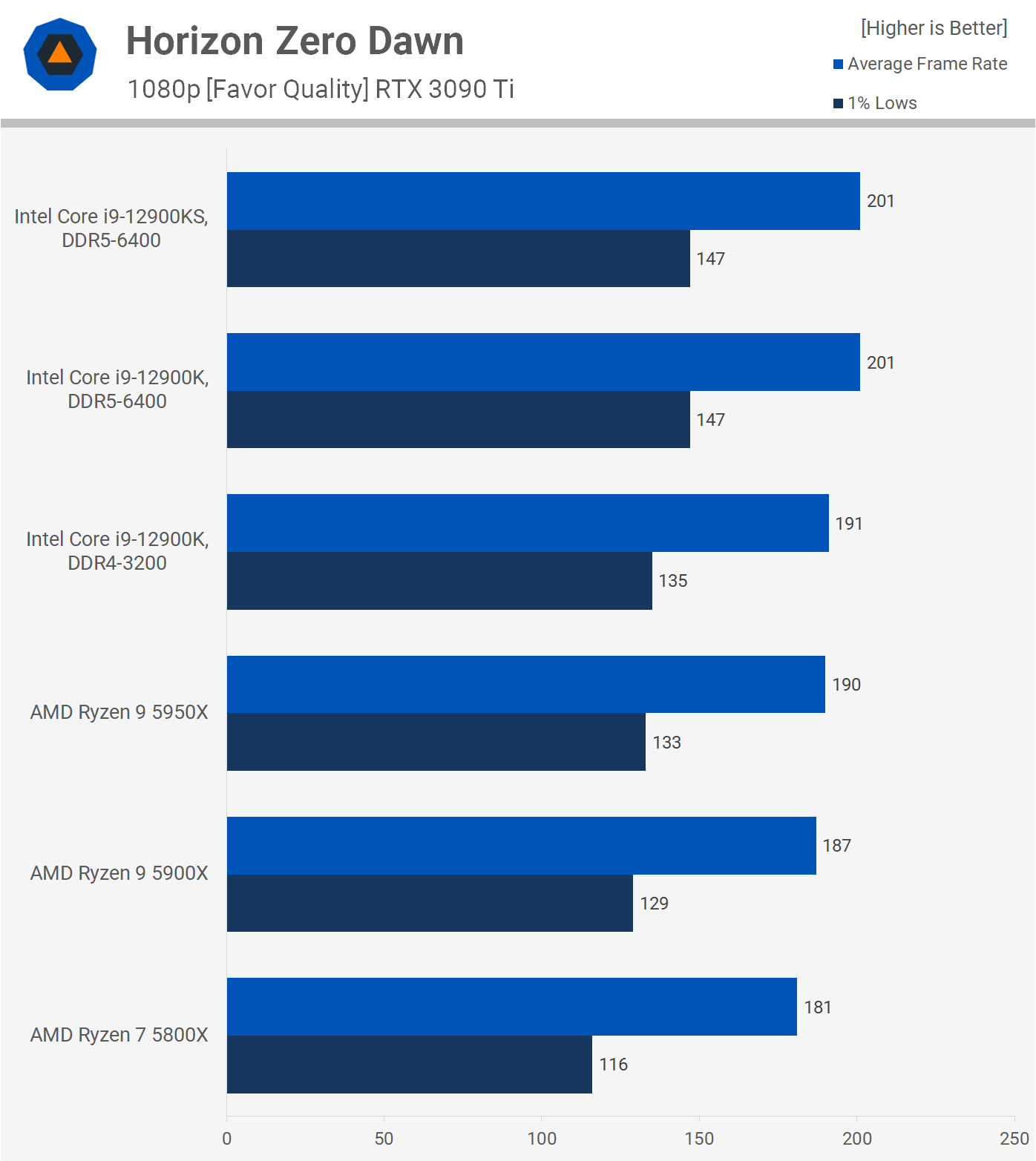
Horizon Zero Dawn is less CPU limited, although we're using slightly dialed down quality settings. We saw a 5% performance boost from DDR4-3200 to DDR5-6400 with the 12900K, but the 12900KS adds no extra performance in this title.
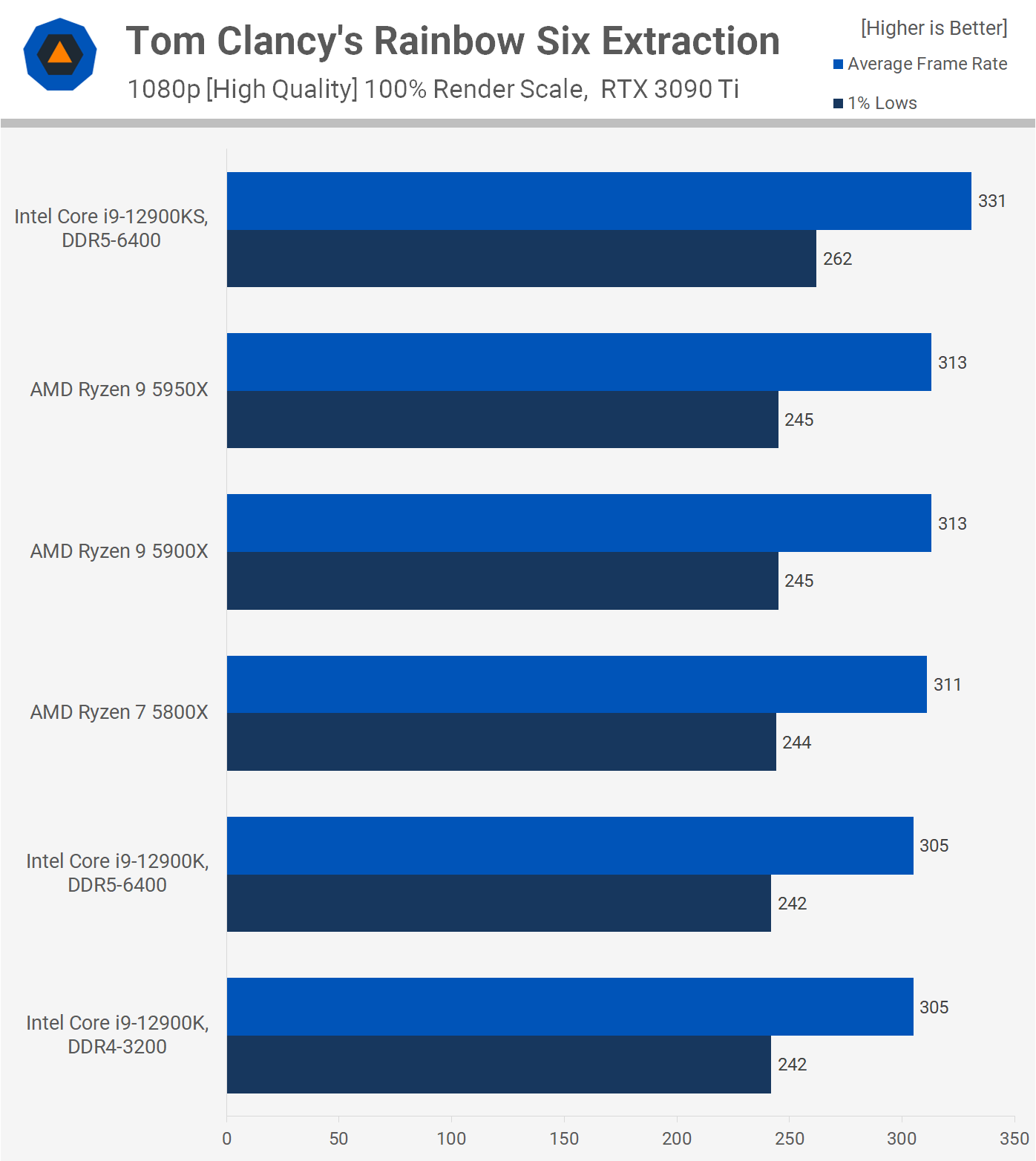
Rainbow Six Extraction results are interesting as we almost appear GPU limited as the 12900K and Zen 3 processors deliver virtually the same level of performance. However, the slightly higher clocked 12900KS was able to push a little further, boosting performance by 9% which is surprising given we've seen little to no performance advantage for the KS model in other games tested.
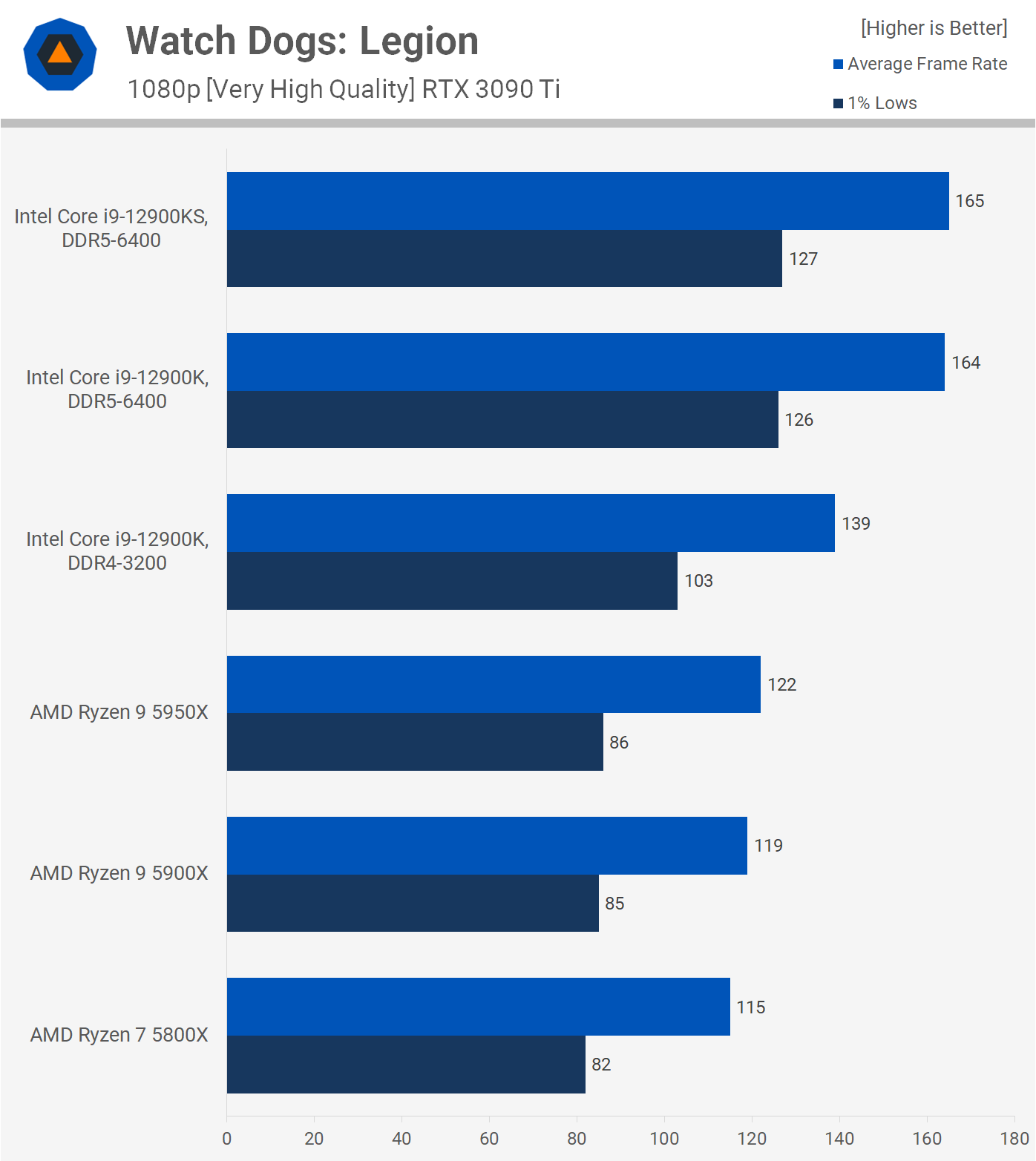
In Watch Dogs: Legion, the 12900K is 14% faster than the 5950X using DDR4-3200 memory, while DDR5-6400 offers the 12900K a further 18% boost making it 34% faster than the 5950X. The 12900KS is no faster than the 12900K though.
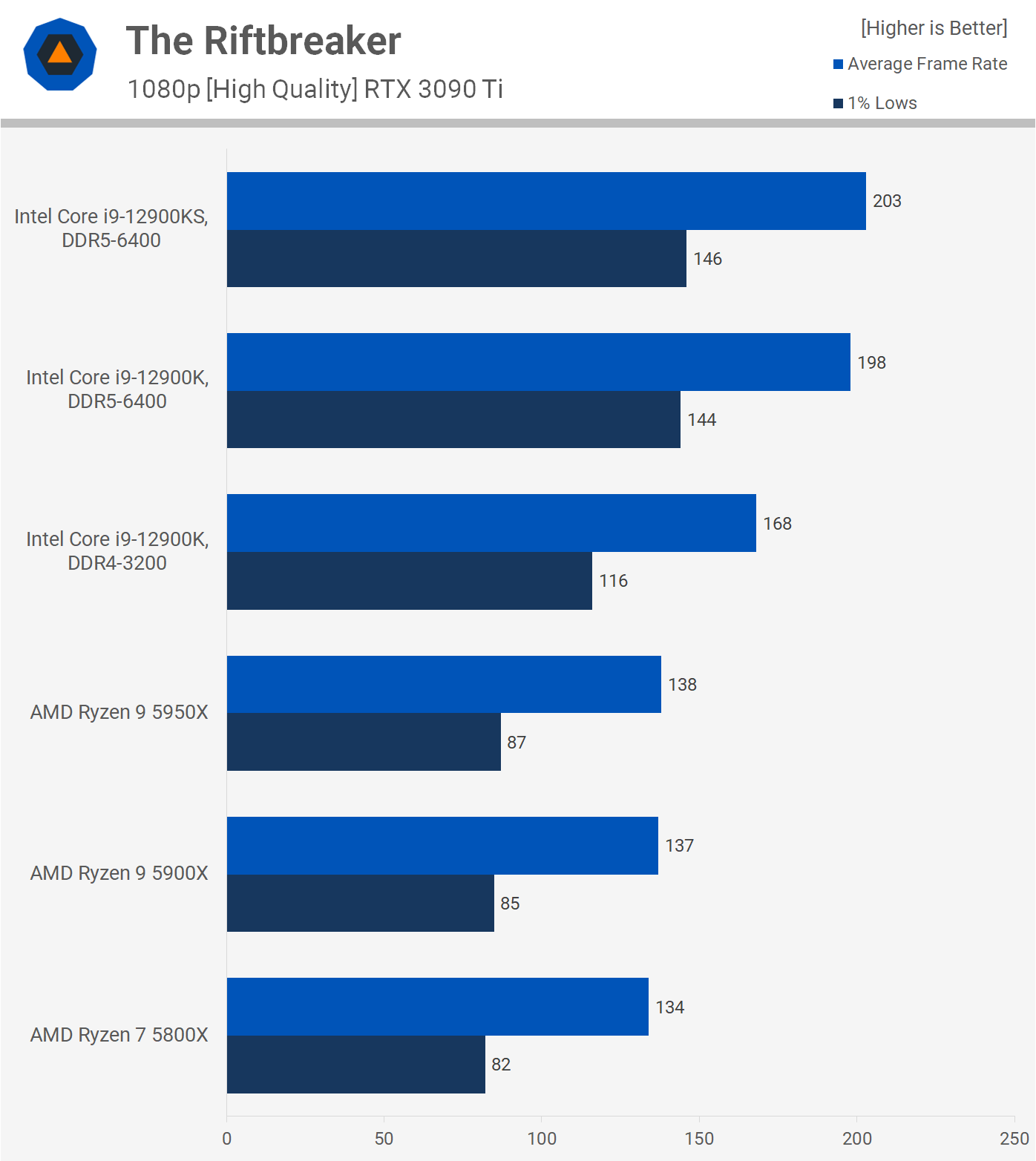
The Riftbreaker results are quite extreme in how much faster the 12th-gen Core i9 processors are than AMD's Zen 3 range when paired with DDR5-6400 memory. The 12900KS is seen to be 47% faster than the 5950X, which is a massive performance uplift. Even when using the same DDR4-3200 memory the 12900K was 22% faster than the 5950X.
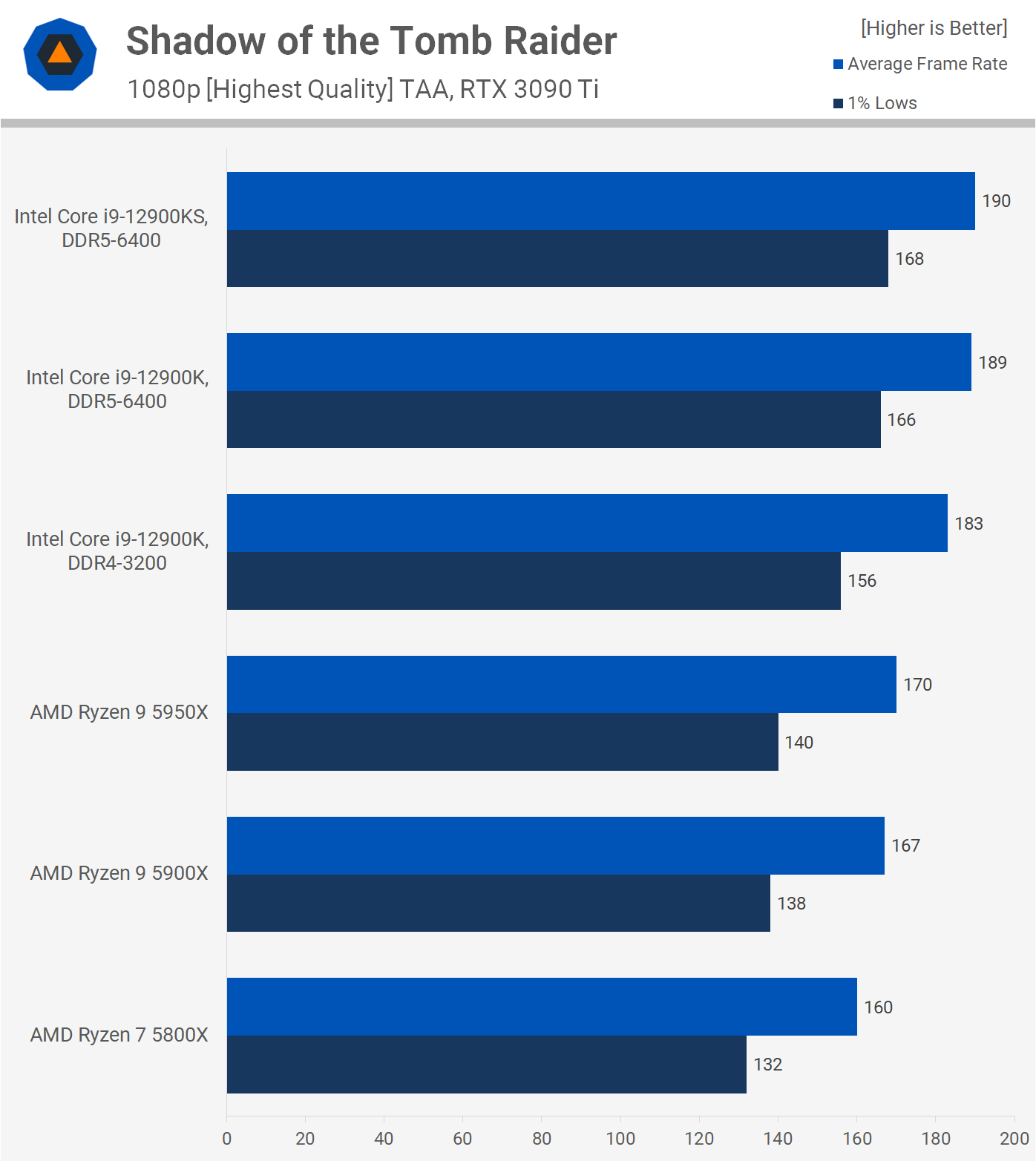
The margins seen in Shadow of the Tomb Raider are less significant, here the 12900K using DDR4-3200 memory was just 8% faster than the 5950X, while switching to DDR5-6400 only improved frame rates by 3%. We see basically no performance difference between the 12900K and 12900KS.
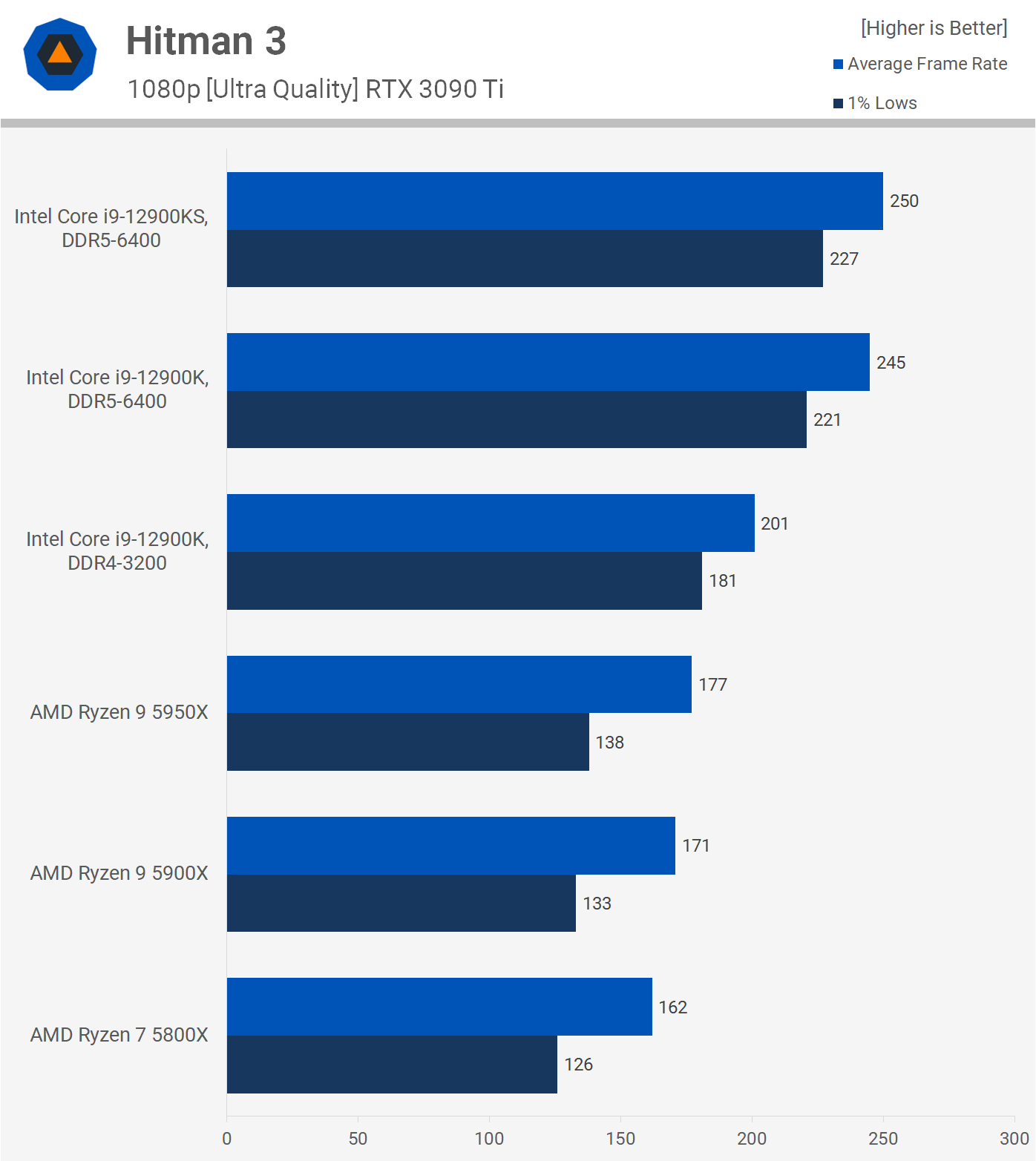
Hitman 3 is another game that enjoys the added bandwidth DDR5 brings as the 12900K was 22% faster using DDR5-6400 memory, opposed to DDR4-3200. When using the same DDR4 memory as the AMD Zen 3 processors, the 12900K was 14% faster than the 5950X. However, once again we see that the 12900KS offers no real benefit over the 12900K, boosting performance here by just 2%.
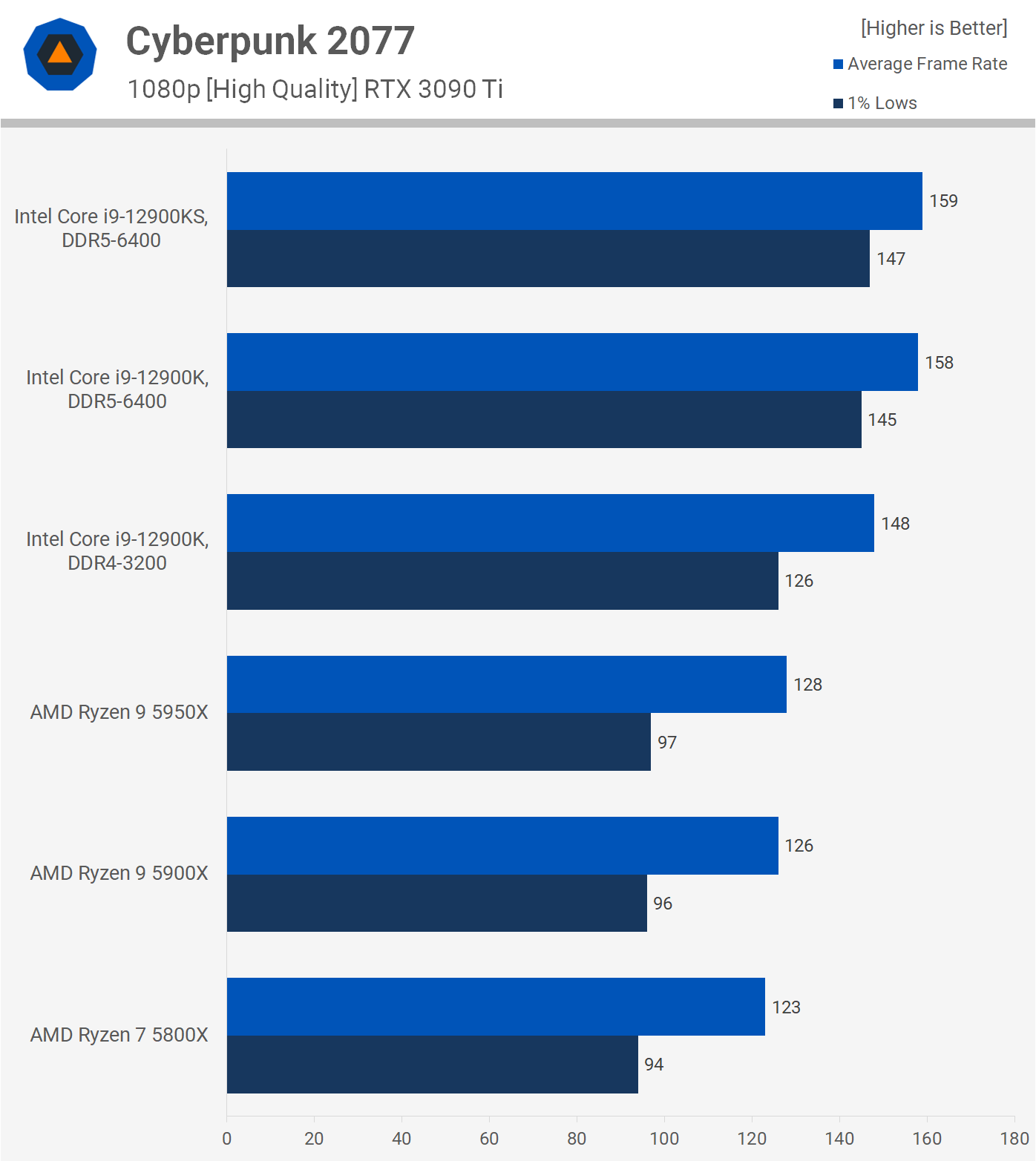
Once again, the 12900KS is no faster than the 12900K in Cyberpunk 2077. The 12900K saw a 7% boost to the average frame rate when going from DDR4-3200 to DDR5-6400, and a 15% improvement in 1% low performance. When compared to the 5950X, the 12900KS was 24% faster when also using higher clocked DDR5 memory.
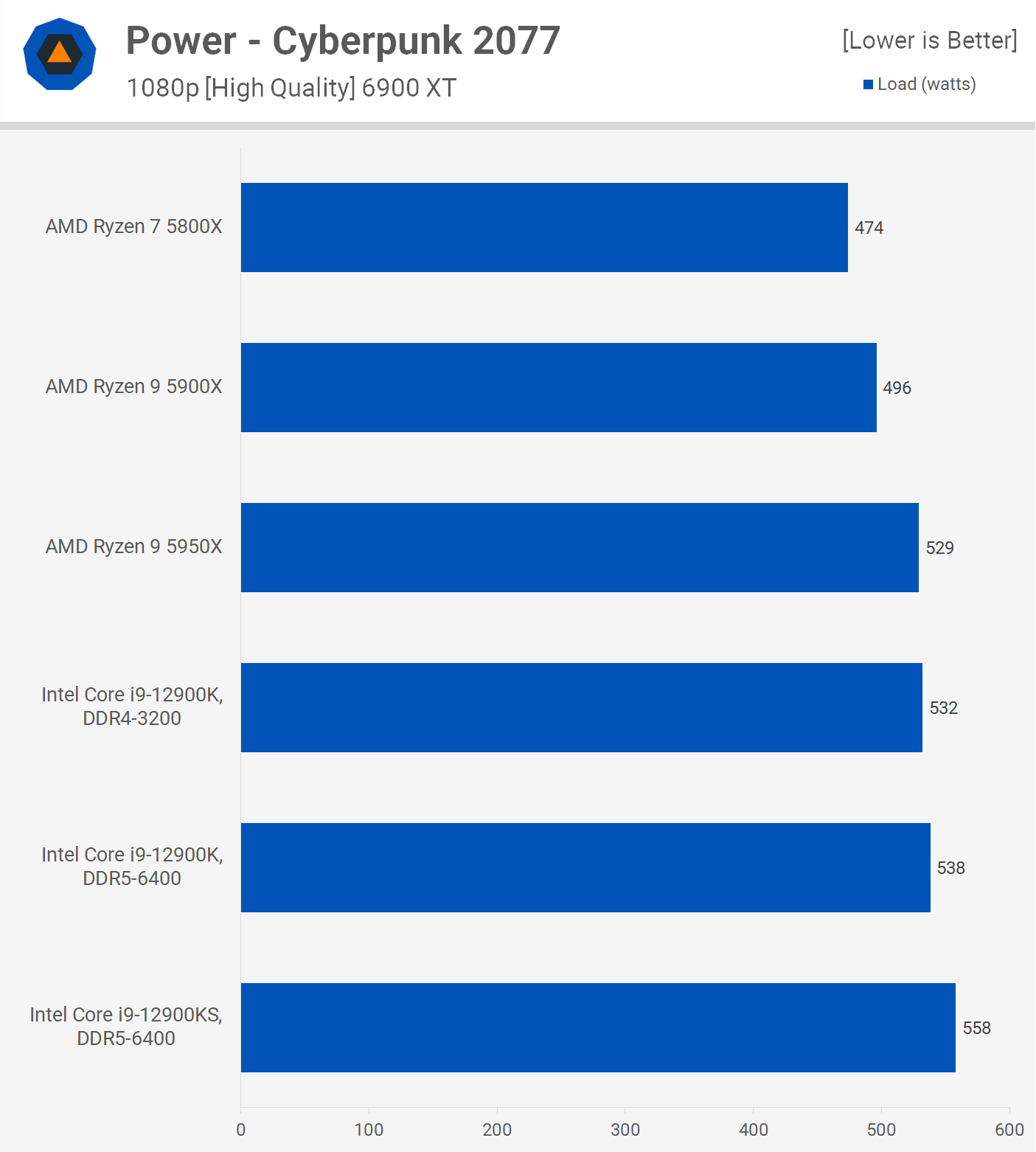
As for total system power usage in games, the 12900KS consumed 20 watts more than the 12900K, increasing power consumption by 4%. Not a significant margin by any means, but considering we saw little to no performance improvement, this hurts efficiency.
How Good Is It?
The Core i9-12900KS reminds us of another recent launch, the GeForce RTX 3090 Ti, in the sense that it's very similar to a part that came before it with a slight overclock for a negligible performance uplift and it comes at a hefty price premium.
That said, the RTX 3090 Ti happens to have a lot more going for it, such as improved memory density that helped to greatly improve thermals, massive new coolers that run quiet despite the 450W power rating, and a fairly consistent performance uplift.
The 12900KS on the other hand is the same CPU that doesn't come with a cooler, it's barely any faster, most of the time you can't even measure the difference, it's even less efficient and more difficult to cool. If it's going to be 30 or 50 percent more expensive than the original 12900K, that's going to be very hard to recommend.
Frankly, for gamers, the Core i9-12900K wasn't even the best choice. For that we'd go with the 12700K as it drops half the E-cores which are currently useless for gaming, but maintains all 8 P-Cores. The 12700K costs $370 US, meaning you can buy two for the price of a single 12900KS, heck, you'll even have some change left over. In that sense, the 12900KS is another dumb product, and it's probably why Intel didn't send them out to reviewers.
For the kind of money you're supposed to pay for the 12900KS, you could buy an entire CPU/motherboard/RAM combo based on the 12700KF and have a system that will perform extremely close to the Core i9 anyway. So who is it for? We can't say we recommend this one. We guess if you're an extreme overclocker, paying a massive premium for binned silicon might make sense, but for everyone else it's a huge waste of money.
Shopping Shortcuts:
- Intel Core i9-12900KS on Amazon
- Intel Core i9-12900K on Amazon
- Intel Core i7-12700K on Amazon
- AMD Ryzen 9 5950X on Amazon
- AMD Ryzen 9 5900X on Amazon
- AMD Ryzen 7 5800X on Amazon
Further Testing
Since we published this review, we have run additional benchmarks around high-end Intel CPUs, here are new reviews and comparisons you may be interested in:
